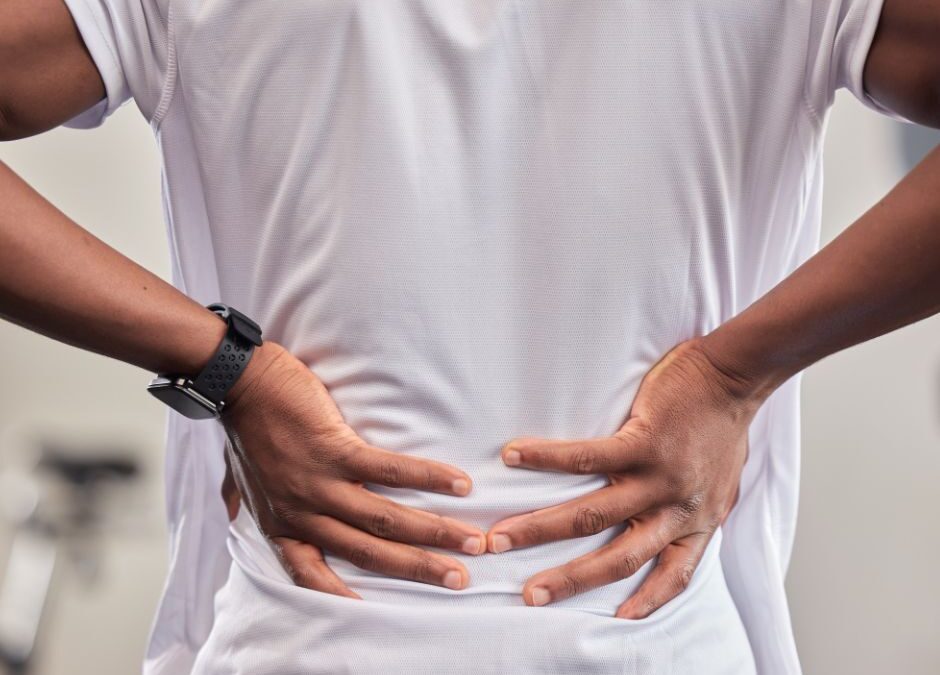If I have a sore back, why should I concentrate on my hips?
When you have a sore back, especially if it’s a chronic issue, the problem might not solely originate from the back itself.
Often, imbalances or tightness in other areas of the body, such as the hips, can contribute to back pain. A key point is that the hips are a complex joint, and they play a significant role in providing stability and mobility to the lower back and pelvis. Therefore, if the muscles surrounding the hips are tight or weak, this can lead to poor posture and reduce hip stability. Which in turn can cause strain on the lower back.
Hip Mobility
There is a correlation between loss of hip extension (kicking your leg back) and lower back pain, with as little as 10 degrees being significant. And as we know our body will compensate, but hips don’t extend? No problem! Accordingly, we will extend our spine more. Similarly, a forward tilt posture and tight hip flexors reduce hip extension mobility. Moreover, leading to the lower back bearing the load by hyperextending. Hence, by addressing the tightness or weakness in the hips through stretching, strengthening exercises, it’s possible to alleviate strain on the lower back and reduce pain. Therefore, even though you may be feeling discomfort primarily in your back, focusing on the hips can be an effective way to address the underlying causes of your pain and improve overall function and comfort.
Hip Strength
Interestingly, weakness in the muscles surrounding the hips, such as the glutes and hip abductors, can also contribute to back pain. Additionally, studies have demonstrated that strengthening these muscles can help stabilise the pelvis. As well as reduce stress on the lower back. In addition, a study has found that a targeted hip muscle strengthening program led to significant improvements in pain and function in individuals with chronic lower back pain.
Hip / Pelvic Stability
Moreover, proper hip/pelvic stability can help to maintain a healthy spine. However, instability in the pelvic, such as pelvic tilt or rotation, can contribute to back pain by placing uneven pressure on the vertebral discs and surrounding structures. In spite of this, there is minimal evidence indicating that poor posture causes lower back pain; instead, it is more likely that back pain results in poor posture.
Biomechanical Factors
Biomechanical factors play a significant role in the relationship between hip and back pain. Nevertheless, poor posture due to pain, excessive sitting, and repetitive movements can lead to muscle imbalances and dysfunction in both the hips and the back. By addressing these factors through ergonomics, postural correction exercises, and movement retraining, can help reduce pain and improve function in individuals with back pain.
In conclusion..
Overall, the evidence suggests that addressing hip issues, including flexibility, strength, and hip stability, can play a crucial role in the management of back pain. And integrating targeted interventions to improve hip function alongside traditional treatments for back pain may lead to better outcomes and long-term relief for individuals suffering from lower back pain.
References:
de Sousa, C. S., de Jesus, F. L. A., Machado, M. B., Ferreira, G., Ayres, I. G. T., de Aquino, L. M., Fukuda, T. Y., & Gomes-Neto, M. (2019). Lower limb muscle strength in patients with low back pain: A systematic review and meta-analysis. Journal of Musculoskeletal and Neuronal Interactions, 19(1), 69-78.
Kripa, S., & Kaur, H. (2021). Identifying relations between posture and pain in lower back pain patients: A narrative review. Bulletin of the Faculty of Physical Therapy, 26, 34. https://doi.org/10.1186/s43161-021-00052-w
Mellin, G. (1988). Correlations of hip mobility with degree of back pain and lumbar spinal mobility in chronic low-back pain patients. Spine (Philadelphia, Pa. 1976), 13(6), 668-670. https://doi.org/10.1097/00007632-198813060-00012
Pizol, G. Z., Miyamoto, G. C., & Cabral, C. M. N. (2024). Hip biomechanics in patients with low back pain, what do we know? A systematic review. BMC Musculoskeletal Disorders, 25(1), 415. https://doi.org/10.1186/s12891-024-07463-5
Santamaría, G., Rodríguez, I., Rodríguez-Pérez, V., Cobreros-Mielgo, R., Lantarón-Caeiro, E., Seco-Casares, M., & Fernández-Lázaro, D. (2023). Effect of hip muscle strengthening exercises on pain and disability in patients with non-specific low back pain – A systematic review. Sports, 11(9), 167. https://doi.org/10.3390/sports11090167
Shum, G. L. K., Crosbie, J., & Lee, R. Y. W. (2005). Effect of low back pain on the kinematics and joint coordination of the lumbar spine and hip during sit-to-stand and stand-to-sit. Journal of Orthopedic Research, 37(3), 245-258. https://doi.org/10.1097/01.brs.0000176195.16128.27
Do you have any questions?
Call us on (03) 9857 0644 or (07) 3505 1494 (Paddington)
Email us at admin@mdhealth.com.au
Check out our other blog posts here
Our clinical staff would be happy to have chat if you have any questions.
Take the first step to a healthier you!
Would you prefer for someone to contact you regarding booking your Initial Physiotherapy appointment, Initial Exercise Physiology, Initial Osteopathy session or FREE Full Body Assessment*?
Or do you have any other enquiry about our services at MD Health?
Please fill in this form and someone from MD Health will be in touch with you soon.
Alternatively please call us on 03 9857 0644 (Kew East), 03 9842 6696 (Templestowe), 03 8683 9442 (Carlton North) or 07 3505 1494 (Paddington) to book now!
For all new clients who wish to come in for a one-off, casual or adhoc basis for Physiotherapy or Exercise Physiology the Initial Physiotherapy or Initial Exercise Physiology appointment is a paid service.
** The 13 Week Clinical Pilates Program at MD Health is not a lock in contract and you are not required to attend for the full 13 weeks if you do not wish.



